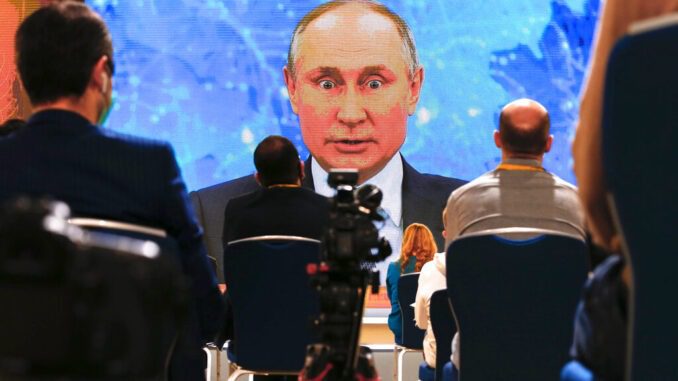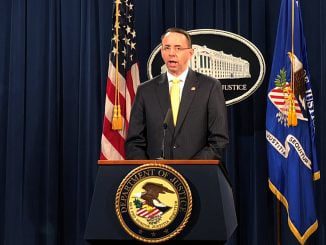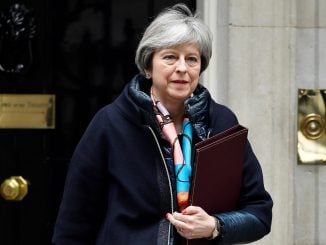
MOSCOW — Russian President Vladimir Putin on Thursday rejected allegations that the Kremlin was behind the poisoning of his top political foe, opposition leader Alexei Navalny, and accused U.S. intelligence agencies of fomenting the claims even as he held out hope for better ties with Washington.
Speaking via video hookup during his annual marathon news conference that lasted 4 1/2 hours, the Russian leader countered the accusations by saying that if the Kremlin wanted to poison Navalny, it would have succeeded.
“If there was such a desire, it would have been done,” Putin said with a chuckle.
Navalny fell sick on Aug. 20 during a domestic flight in Russia and was flown while still in a coma to Berlin for treatment two days later. Labs in Germany, France and Sweden, and tests by the Organization for the Prohibition of Chemical Weapons, established that he was exposed to a Soviet-era Novichok nerve agent.
Russian authorities have vehemently denied any involvement in the poisoning.
On Monday, the investigative group Bellingcat and Russian outlet The Insider released a report alleging that operatives from the FSB, Russia’s domestic security agency, which is a top KGB successor, followed Navalny during his trips since 2017, had “specialized training in chemical weapons, chemistry and medicine,” and “were in the vicinity of the opposition activist in the days and hours of the time-range during which he was poisoned.”
The investigation, done also in cooperation with CNN and Der Spiegel, identified the supposed FSB operatives and laboratories working on poisons like Novichok after analyzing telephone metadata and flight information. It mentioned two instances in 2019 and 2020, in which Navalny or his wife Yulia suffered from unexplained symptoms.
Navalny said the investigation has proven beyond doubt that FSB operatives tried to kill him on Putin’s orders.
In his first comment since the report’s publication, Putin charged that it relied on data provided by U.S. spy agencies. Its authors have denied any link to U.S. or any other Western intelligence services.
“It’s not some kind of investigation, it’s just the legalization of materials provided by U.S. special services,” he said, adding that it means that Navalny “relies on the support of U.S. special services.”
“It’s curious, and in that case, special services indeed need to keep an eye on him,” Putin said. “But that doesn’t mean that there is a need to poison him. Who would need that?”
The president reaffirmed a call for Germany and others to conduct a joint probe and share specific proof of Navalny’s poisoning, including his biological samples.
Speaking in Berlin, German Foreign Minister Heiko Maas said Russia has had ample opportunity to investigate the case.
“In the past weeks and months, we have seen so many smoke screens raised by Moscow in connection with the Navalny case,” he said. “I believe there have been a variety of opportunities to investigate the things that happened in Russia in relation to the poisoning of Mr. Navalny there, or at least to initiate an investigation, but this has never been the case and we have serious doubts about their willingness to meet their obligations.”
Putin alleged that Navalny was accusing the Kremlin of ordering to poison him in order to raise his political profile. As before, Putin refrained from mentioning Navalny by name, referring to him as a “blogger” and the “Berlin patient.”
Navalny tweeted after the news conference that Putin effectively confirmed the investigative report proving that the FSB was shadowing him for nearly four years. “It’s impossible to deny our concrete proof,” he said.
Putin emphasized that Russia is ready to discuss its new hypersonic weapons system, including the Avangard glide vehicle, in future arms control talks with the United States. He charged that Moscow built Avangard and other new weapons to prevent the U.S.-designed missile defense system from eroding Russia’s nuclear deterrent.
“We either had to develop our own missile defense, or create systems immune to missile defense,” Putin said. “We did it with hypersonic weapons, including Avangard.”
Russian officials say Avangard can fly 27 times faster than the speed of sound and make sharp maneuvers on its way to target to dodge the enemy’s missile shield.
Putin said Russia is also completing tests of another hypersonic missile, Zircon, designed for its warships and submarines.
The Russian leader added that the development of other weapons systems that he announced in 2018, including the Burevestnik nuclear-powered cruise missile and the Poseidon nuclear drone, was proceeding as planned.
Poseidon is capable of unleashing a nuclear explosion, causing a powerful tsunami.



